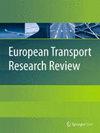最后一英里自主配送机器人:文献综述
IF 4.2
3区 工程技术
Q1 TRANSPORTATION
引用次数: 0
摘要
本文献综述探讨了自动驾驶自主配送机器人(ADRs)如何影响最后一英里配送,如何为物流和运输业增值,以及如何为创造有竞争力的商业模式做出贡献。自动驾驶汽车仍是一项发展中的技术,而自动驾驶送货机器人有可能成为最后一英里问题的解决方案之一,特别是在城市和需要运送越来越多包裹的城市货运中。随着电子商务和要求更高的客户的出现,最后一英里配送也在发生变化。然而,这种发展面临着基础设施、二氧化碳排放等外部因素以及更短交货时间要求等方面的挑战。本综述重点关注路边自动取货系统,揭示了四大主题(运营、基础设施、法规和接受度),通过这些主题,我们解释了使用路边自动取货系统进行最后一英里送货的障碍和益处。研究表明,ADR 的运营可以通过降低成本、优化时间利用和减少外部性来影响最后一英里配送。审查还表明,如果要更广泛地使用路边自动取货系统,就必须改变最后一英里基础设施的基础。ADR 的法规尚未出台,这使得市场有些混乱。社会对 ADR 的接受程度是另一个挑战,因为 ADR 的创新仍是一个陌生的新事物。总之,根据所审查文章的良好结果,ADR 在最后一英里配送中的应用显示出巨大的潜力。然而,大多数关于 ADR 的研究都是理论性的,例如模型,这就凸显了实际案例研究和实施的必要性。本文章由计算机程序翻译,如有差异,请以英文原文为准。
Autonomous last-mile delivery robots: a literature review
This literature review investigates how self-driving autonomous delivery robots (ADRs) impact last-mile deliveries, add value to the logistics and transport industry, and contribute to creating competitive business models. Autonomous vehicles are still a developing technology and ADRs could possibly be one of the solutions to the last-mile problem, in particular in cities and for urban freight with an increasing number of parcels to deliver. Last-mile delivery is also changing as e-commerce and more demanding customers emerge. Such development, however, faces challenges regarding infrastructure, externalities such as CO2 emissions, and shorter delivery-time requirements. This review, focused on ADRs, reveals four major themes (operations, infrastructure, regulations, and acceptance) through which we explain the barriers and benefits of using ADRs for last-mile deliveries. The review shows that the operations of ADRs can impact last-mile deliveries by lowering costs, optimising the use of time, and reducing externalities. The review also shows that the foundation of last-mile infrastructure would have to change if ADRs are to be used to a greater extent. Regulations for ADRs are still not yet in place, which makes the market somewhat confused. The acceptance of ADRs in society is another challenge because the innovation of ADRs is still new and unfamiliar. Altogether, the use of ADRs for last-mile deliveries shows great potential, based on the promising results of the articles reviewed. However, most studies on ADRs have been theoretical in nature, such as models, which highlights the need for real-world case studies and implementations.
求助全文
通过发布文献求助,成功后即可免费获取论文全文。
去求助
来源期刊

European Transport Research Review
Engineering-Mechanical Engineering
CiteScore
8.60
自引率
4.70%
发文量
49
审稿时长
13 weeks
期刊介绍:
European Transport Research Review (ETRR) is a peer-reviewed open access journal publishing original high-quality scholarly research and developments in areas related to transportation science, technologies, policy and practice. Established in 2008 by the European Conference of Transport Research Institutes (ECTRI), the Journal provides researchers and practitioners around the world with an authoritative forum for the dissemination and critical discussion of new ideas and methodologies that originate in, or are of special interest to, the European transport research community. The journal is unique in its field, as it covers all modes of transport and addresses both the engineering and the social science perspective, offering a truly multidisciplinary platform for researchers, practitioners, engineers and policymakers. ETRR is aimed at a readership including researchers, practitioners in the design and operation of transportation systems, and policymakers at the international, national, regional and local levels.
 求助内容:
求助内容: 应助结果提醒方式:
应助结果提醒方式:


